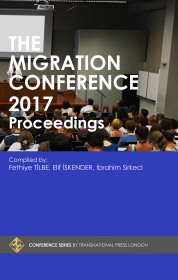Labor Market Effects of Migration: An extension of the Ricardian Model
Labor Market Effects of Migration: An extension of the Ricardian Model
Author(s): Karen Jacqueline Contreras Lisperguer
Subject(s): National Economy, Labor relations, Evaluation research, Migration Studies, Socio-Economic Research
Published by: Transnational Press London
Keywords: Migration; economics; labor market effects; short-run; proceedings; template; short paper;
Summary/Abstract: One important discussion today is the possible negative effects that immigrants have on the wages of natives. In accordance with the theory of labor demand and supply, people believe that new immigrants could take the jobs of the existing workers. Many researchers have showed that there is little impact of immigration on wages and employment of existing workers as for example for the U.S. and the UK . The model fails to explain job polarization and wage inequality between natives and immigrants. Is it possible to model the effects of migration on wages in a different way that has the potential to be more tractable? Many of the shortcomings of the model can be addressed by using a task-based approach to the effects of migration in the labor market. This paper presents such extension following the Ricardian Skill Model (Autor, Levy, & Murnane, 2003). An analysis, without solving for the equilibrium and keeping capital and technology constants in the short run, gives us the following results: In the presence of migration, there will be a re-assignation of tasks. The wages of local workers will not be necessarily affected, but wage inequality within the labor market should increase.
Book: TMC2017 Conference Proceedings
- Page Range: 452-460
- Page Count: 9
- Publication Year: 2017
- Language: English
- Content File-PDF

